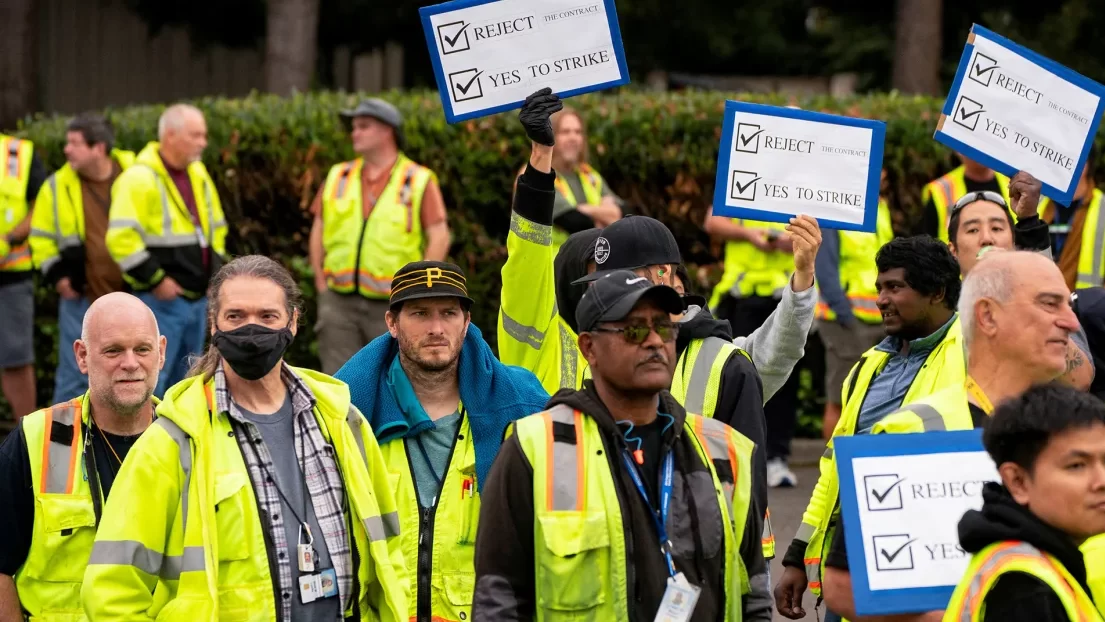The Boeing strike 2024 is set to begin, as over 30,000 workers are poised to halt production after rejecting a proposed labor contract. With 94.6% of the workers voting against Boeing’s offer of a 25% wage increase, the union is pushing for a 40% raise to cover rising living expenses. The workers, primarily from Seattle and Oregon, voted overwhelmingly in favor of a strike, demanding better pay and conditions.
Union President Jon Holden declared the strike an “unfair labor practice” action, citing coercive questioning, discriminatory conduct, and unlawful surveillance by Boeing. He called on the company to return to negotiations with a fairer proposal, urging Boeing to take into account the economic realities that workers face today.
Why Did Workers Reject the Contract?
The workers’ decision to go on strike stems from their dissatisfaction with the offered wage increases. While Boeing’s proposal included a 25% wage boost along with improvements in health and retirement benefits, the union felt this wasn’t enough to address the sharp rise in the cost of living.
Workers are struggling with soaring costs for housing, healthcare, and day-to-day necessities, especially in high-cost areas like Seattle. As inflation has increased, workers are seeking wage increases that match their financial realities.
The Boeing strike 2024 highlights these concerns, as employees express that they are not receiving compensation that reflects their contributions or keeps pace with living expenses. Union representatives argue that the wage proposal doesn’t account for the long-term security and well-being of the workforce.
The Potential Financial Impact on Boeing
The Boeing strike 2024 could have a profound financial impact on the company. Analysts estimate that a 30-day strike could cost Boeing approximately $1.5 billion. With Boeing already struggling due to production delays and supply chain issues, the timing of the strike could be a severe blow.
The company has burned through $8 billion this year, dealing with mounting debt and challenges in meeting production targets. CEO Kelly Ortberg, who has only been in the role for five weeks, warned workers that the strike could destabilize the company’s recovery efforts. He had encouraged workers to accept the contract to avoid further disruption, but with 96% of workers voting in favor of the strike, Boeing is now facing a significant challenge.
Broader Implications for the Aerospace Industry

The Boeing strike 2024 not only threatens Boeing’s production line but also has far-reaching implications for the aerospace industry as a whole. Suppliers who rely on Boeing for orders may experience disruptions if the strike continues for an extended period.
Airlines waiting for new planes could face delays, further compounding the operational issues within the industry. This strike came at a time when Boeing was already under increased scrutiny due to safety concerns and production issues with the 737 Max.
The aerospace sector is highly interconnected, and any significant halt in production from a major player like Boeing can have ripple effects. Suppliers may struggle with disrupted schedules, and contractors who depend on Boeing’s projects could face financial difficulties if the strike lasts for a prolonged period. This broader impact highlights the critical nature of resolving the strike as soon as possible.
What’s Next?
As the Boeing strike 2024 begins, both sides will need to return to the negotiation table. The union is seeking a deal that addresses workers’ demands for better wages and fair treatment, while Boeing must balance these demands with the company’s financial stability.
The longer the strike continues, the more it will affect Boeing’s production and potentially disrupt the aerospace supply chain. Boeing’s leadership, under Kelly Ortberg, will need to act swiftly to find a resolution that meets the workers’ demands without jeopardizing the company’s financial future. With analysts already predicting significant losses if the strike lasts 30 days or more, it’s clear that both sides have much at stake.
The Boeing strike 2024 marks a critical moment for the company and its workforce. With over 30,000 employees demanding better wages and fair treatment, Boeing faces a substantial challenge in navigating this dispute. The outcome of this strike will likely shape Boeing’s future, not just in terms of its relationship with its workers, but also its production capacity and financial stability.
As the strike moves forward, all eyes will be on Boeing to see how quickly the company can address workers’ concerns and bring both sides back to the bargaining table. The stakes are high, and the longer the strike drags on, the more it will impact Boeing’s ability to recover from recent setbacks. The coming weeks will be crucial in determining the future of one of the world’s largest aerospace manufacturers.





